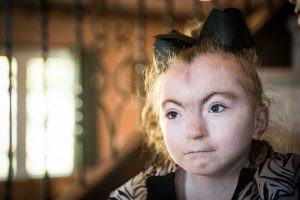Elie Dolgin in Nature:
 A deep-learning algorithm is helping doctors and researchers to pinpoint a range of rare genetic disorders by analysing pictures of people’s faces. In a paper1 published on 7 January in Nature Medicine, researchers describe the technology behind the diagnostic aid, a smartphone app called Face2Gene. It relies on machine-learning algorithms and brain-like neural networks to classify distinctive facial features in photos of people with congenital and neurodevelopmental disorders. Using the patterns that it infers from the pictures, the model homes in on possible diagnoses and provides a list of likely options.
A deep-learning algorithm is helping doctors and researchers to pinpoint a range of rare genetic disorders by analysing pictures of people’s faces. In a paper1 published on 7 January in Nature Medicine, researchers describe the technology behind the diagnostic aid, a smartphone app called Face2Gene. It relies on machine-learning algorithms and brain-like neural networks to classify distinctive facial features in photos of people with congenital and neurodevelopmental disorders. Using the patterns that it infers from the pictures, the model homes in on possible diagnoses and provides a list of likely options.
Doctors have been using the technology as an aid, even though it’s not intended to provide definitive diagnoses. But it does raise a number of ethical and legal concerns, say researchers. These include ethnic bias in training data sets and the commercial fragmentation of databases, both of which could limit the reach of the diagnostic tool. Researchers at FDNA, a digital-health company in Boston, Massachusetts, first trained the artificial intelligence (AI) system to distinguish Cornelia de Lange syndrome and Angelman syndrome — two conditions with distinct facial features — from other similar conditions. They also taught the model to classify different genetic forms of a third disorder known as Noonan syndrome. Then the researchers, led by FDNA chief technology officer Yaron Gurovich, fed the algorithm more than 17,000 images of diagnosed cases spanning 216 distinct syndromes. When presented with new images of people’s faces, the app’s best diagnostic guess was correct in about 65% of cases. And when considering multiple predictions, Face2Gene’s top-ten list contained the right diagnosis about 90% of the time.
More here.
